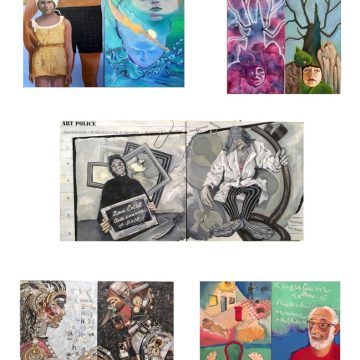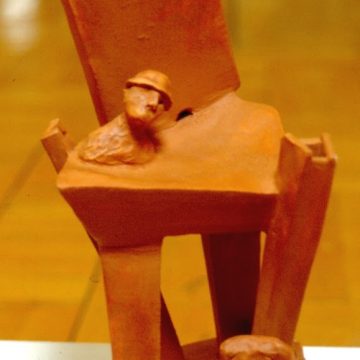In Another Place, At Another Time
The story begins on a family visit. Father, mother, five-year old son and one-and-half year old daughter are visiting the father’s brother’s family. The uncle has two twin teenaged sons who are forced to be home for the gathering.
When the cousins are gathered, the twins are assigned the entertainment of the children. Off the four go to the boys’ room in the back of the house, out of earshot of the adults gathered in the living room. The plan is this: the twins will give their cousins toys to play with and sneak out the kitchen door to join their friends.
The five-year old boy is easy enough to occupy. He sits happily in a corner pretending to fly the planes and race the cars he is given. The chubby baby girl is another matter. She not only walks, she runs, and the second her hand is free of a cousin’s hold, she is off, laughing happily. The twins have to chase her all over the room. Her laughter, however, is contagious and soon the teenagers forget their plan and are playing like five-year olds with their cousins.
When the two sets of parents come to gather their children, they are astonished to find the cousins all laughing uproariously. The merriment is caused by the baby’s delight at being swung by the arms between the twins as her brother lies under her swinging feet, either tickling them as they fly by or pretending they are trampling him. The play is interrupted, the five-year old and his sister are gathered up and amid more laughter and farewells, no one pays attention as the baby cries when her coat is put on.
By the time they get home, everyone’s nerves are frayed. The baby has cried the entire way. Nothing calms her; everything the mother tries makes her cry the more, distracting the father as he drives. Once home, the girl refuses warm milk, she pushes the father’s stroking hand away, she cries though her bath and cries until the parents fight. The father leaves the house to go smoke in peace and the brother is sent to his bed without supper for being uncooperative.
For the entire next day, the baby, exhausted, slips in and out of a fretful sleep and whimpering wakefulness. The father is relieved to spend the day at work, the brother happy for once to be in pre-school; the mother feels increasingly helpless and afraid. When the father comes home, they agree they must take the child to the doctor, cost what it may. Something must be wrong beyond teething or gas. The baby won’t eat, but worse she doesn’t tolerate to be touched. Another sleepless night follows.
The doctor examines the child but finds nothing to explain her reactions. “Spoiled!” he announces finally. The treatment? “Let her cry!” The father pays. They go home. They try ignoring her but neither parent can stand leaving the baby alone. Anyway, she doesn’t stop. They sit with her all that third night, taking turns singing softly to her and feeding her formula by the drop as she lies on her back in her bed. By now she barely moves though she keeps up a soft mewling unrelieved by sleep.
Now it’s the weekend. The beach is nearby. The parents agree that they all need fresh air. Perhaps the baby will be happier on the beach. Preparations are made, the mother carefully gathers the half unconscious child in her arms, provoking loud cries that gradually become softer, weaker. As the family walks to the beach, father and son slightly ahead, they try to ignore the looks people give them. The baby continues to cry softly as her mother holds her protectively.
Now they have passed a row of vendors who have set up shop along a stone retaining wall on the beach when the mother feels a tug on her skirt. “Mom,” someone says. She keeps walking. “Mom,” someone says again and she stops and turns, annoyed.
“I won’t buy anything, go away,” the mother says to the girl standing beside her. The child is maybe seven years old, not very clean in her unkempt clothes. Her teeth are brown and her fingernails are broken.
The father has returned with his son to stand with the mother, he says angrily, “What do you want?”
The girl doesn’t flinch, “My granma, she wants to talk to you, mom. There.” and the girl points back along the row of vendors. The father, mother and son turn to look. There, sitting cross-legged on a blanket on the sand is an old woman. She doesn’t look much better than the girl; in fact, she is very old, very bent, and obviously very poor, obviously a widow for she is dressed all in black. She is staring at the family, a vacant look in her eyes.
“We don’t want anything,” the father says but the mother is looking intently at the old woman. She is blind.
“Please, mom,” says the girl, “It’s about your baby.”
To the father’s surprise, the mother is walking to the old woman. He follows with the son to join his wife by the old woman’s blanket.
“Your baby,” says the old woman “she’s crying.” The father snorts. He’s seen this kind of thing before: she’ll offer to sell them some potion or some spell.
But the mother, near tears, says, “I don’t know why.”
“Shh,” The old woman listens, tilting her head. “That baby is hurt.” She shifts, stretches her legs with great difficulty before her on the blanket in a ‘v’. Then says to the mother, “will you trust me?”
The father stands surprised as the mother does not hesitate. She bends and gently hands the baby to the old woman who takes her as if she is made of glass and lays her on the blanket between her legs, feet toward her. Her hands are arthritic but to the mother watching her every gesture, she moves her fingers like they are butterfly wings caressing the child’s body, gently exploring until they hover over the baby’s shoulders. “Ah!” it’s a breath sound, but it could be a shout.
Moving quickly, the blind old woman grasps the baby’s right shoulder with her right hand and putting her left hand on the baby’s chest, snaps her wrist. There is a barely audible pop and then silence. Silence. The baby stops crying. Just like that, after days of it, she stops crying. With the old woman’s hand on her chest, the baby takes a deep breath, sighs and falls deep, deep asleep.
The mother kneels and kisses the old woman’s arthritic hands. The father is reaching into his pocket, shamed, he is peeling bills out of his wallet but the old woman shakes her head. “No money,” she says. “Love your baby.”
That baby grows up with a desire to embrace space, a longing for unfettered movement, and a passion for malleable form. And she comes to love stories, the kinds in which change defeats stasis and where obstacles are nothing to potential.






